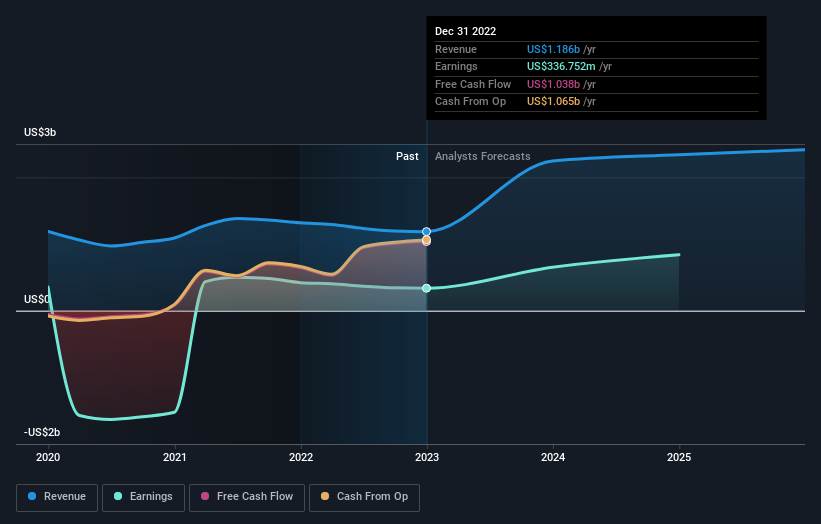After losing 21% in the past year, Columbia Banking System, Inc. (NASDAQ:COLB) institutional owners must be relieved by the recent gain
Key Insights
Institutions' substantial holdings in Columbia Banking System implies that they have significant influence over the company's share price
The top 25 shareholders own 40% of the company
Analyst forecasts along with ownership data serve to give a strong idea about prospects for a business
If you want to know who really controls Columbia Banking System, Inc. (NASDAQ:COLB), then you'll have to look at the makeup of its share registry. And the group that holds the biggest piece of the pie are institutions with 56% ownership. That is, the group stands to benefit the most if the stock rises (or lose the most if there is a downturn).
After a year of 21% losses, last week’s 7.2% gain would be welcomed by institutional investors as a likely sign that returns might start trending higher.
Let's take a closer look to see what the different types of shareholders can tell us about Columbia Banking System.
View our latest analysis for Columbia Banking System
What Does The Institutional Ownership Tell Us About Columbia Banking System?
Many institutions measure their performance against an index that approximates the local market. So they usually pay more attention to companies that are included in major indices.
As you can see, institutional investors have a fair amount of stake in Columbia Banking System. This suggests some credibility amongst professional investors. But we can't rely on that fact alone since institutions make bad investments sometimes, just like everyone does. It is not uncommon to see a big share price drop if two large institutional investors try to sell out of a stock at the same time. So it is worth checking the past earnings trajectory of Columbia Banking System, (below). Of course, keep in mind that there are other factors to consider, too.
Institutional investors own over 50% of the company, so together than can probably strongly influence board decisions. We note that hedge funds don't have a meaningful investment in Columbia Banking System. Looking at our data, we can see that the largest shareholder is BlackRock, Inc. with 6.3% of shares outstanding. In comparison, the second and third largest shareholders hold about 6.2% and 3.9% of the stock.
On studying our ownership data, we found that 25 of the top shareholders collectively own less than 50% of the share register, implying that no single individual has a majority interest.
While it makes sense to study institutional ownership data for a company, it also makes sense to study analyst sentiments to know which way the wind is blowing. There are plenty of analysts covering the stock, so it might be worth seeing what they are forecasting, too.
Insider Ownership Of Columbia Banking System
While the precise definition of an insider can be subjective, almost everyone considers board members to be insiders. Management ultimately answers to the board. However, it is not uncommon for managers to be executive board members, especially if they are a founder or the CEO.
Insider ownership is positive when it signals leadership are thinking like the true owners of the company. However, high insider ownership can also give immense power to a small group within the company. This can be negative in some circumstances.
Our most recent data indicates that insiders own less than 1% of Columbia Banking System, Inc.. It's a big company, so even a small proportional interest can create alignment between the board and shareholders. In this case insiders own US$7.8m worth of shares. Arguably, recent buying and selling is just as important to consider. You can click here to see if insiders have been buying or selling.
General Public Ownership
The general public-- including retail investors -- own 44% stake in the company, and hence can't easily be ignored. While this group can't necessarily call the shots, it can certainly have a real influence on how the company is run.
Next Steps:
I find it very interesting to look at who exactly owns a company. But to truly gain insight, we need to consider other information, too. Consider for instance, the ever-present spectre of investment risk. We've identified 1 warning sign with Columbia Banking System , and understanding them should be part of your investment process.
If you are like me, you may want to think about whether this company will grow or shrink. Luckily, you can check this free report showing analyst forecasts for its future.
NB: Figures in this article are calculated using data from the last twelve months, which refer to the 12-month period ending on the last date of the month the financial statement is dated. This may not be consistent with full year annual report figures.
Have feedback on this article? Concerned about the content? Get in touch with us directly. Alternatively, email editorial-team (at) simplywallst.com.
This article by Simply Wall St is general in nature. We provide commentary based on historical data and analyst forecasts only using an unbiased methodology and our articles are not intended to be financial advice. It does not constitute a recommendation to buy or sell any stock, and does not take account of your objectives, or your financial situation. We aim to bring you long-term focused analysis driven by fundamental data. Note that our analysis may not factor in the latest price-sensitive company announcements or qualitative material. Simply Wall St has no position in any stocks mentioned.
Join A Paid User Research Session
You’ll receive a US$30 Amazon Gift card for 1 hour of your time while helping us build better investing tools for the individual investors like yourself. Sign up here


